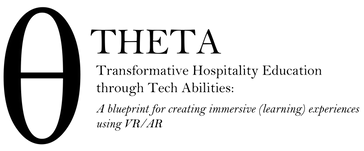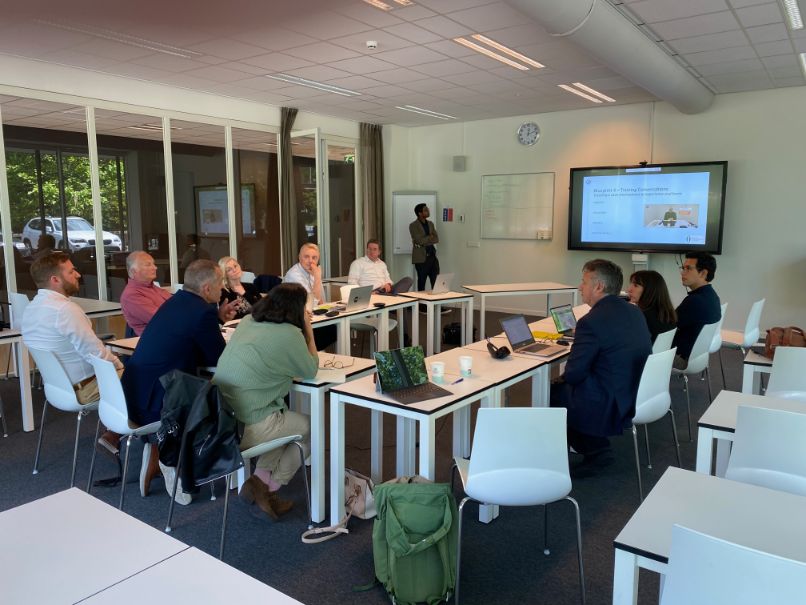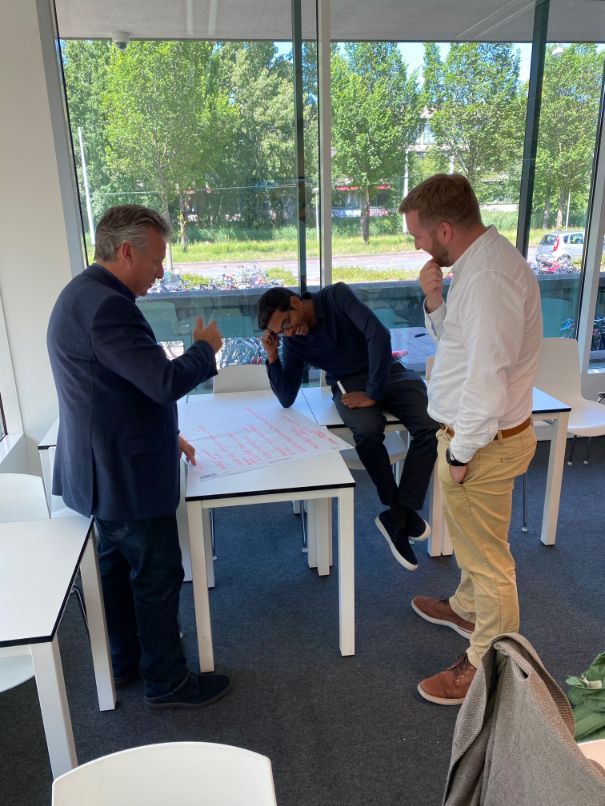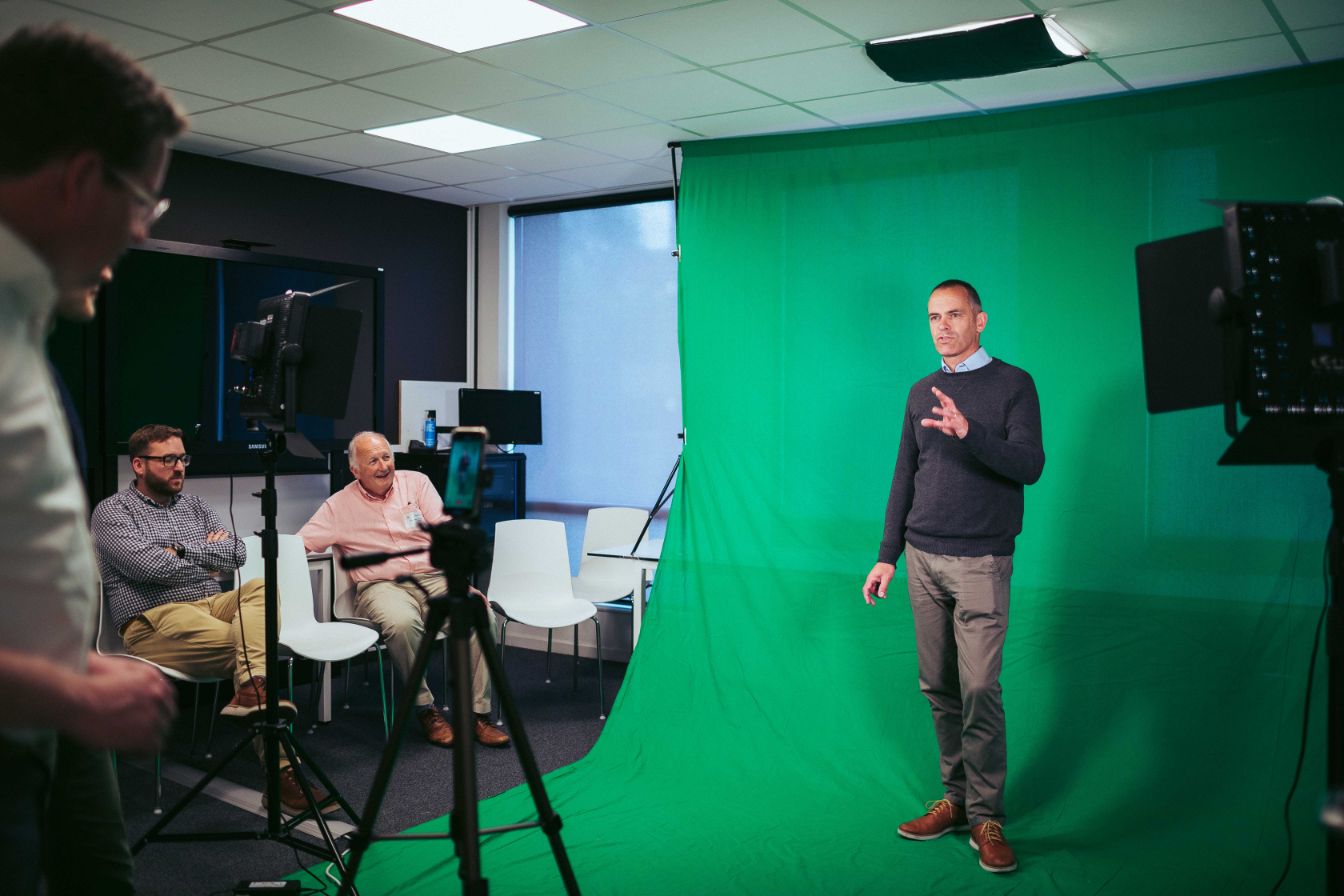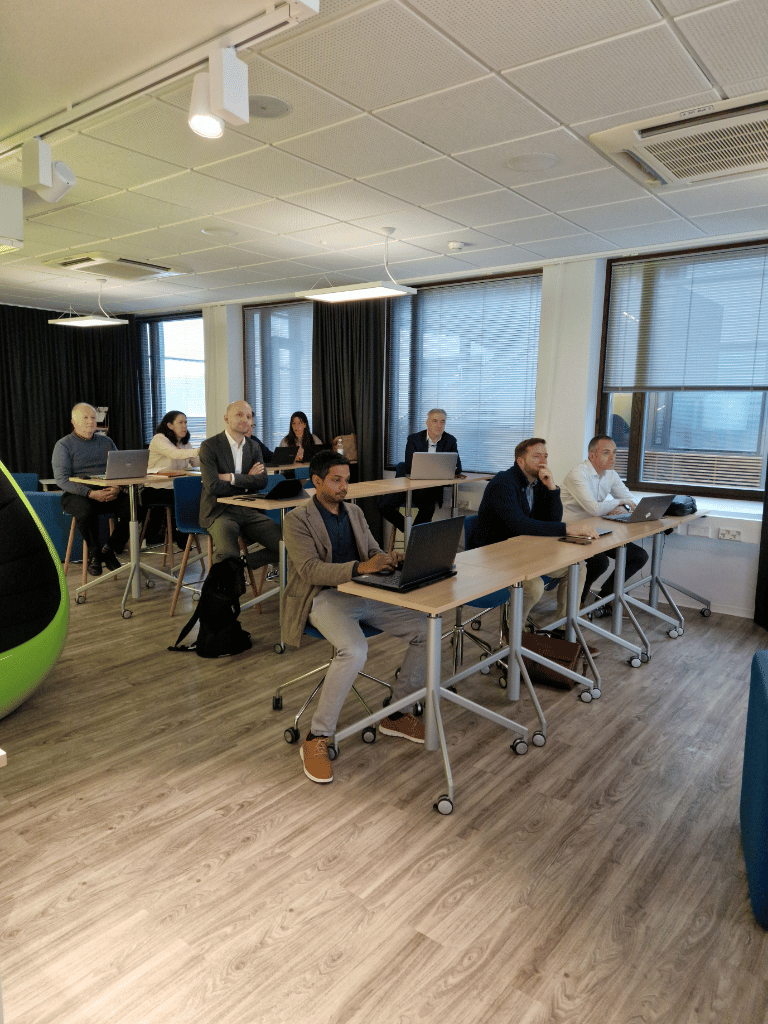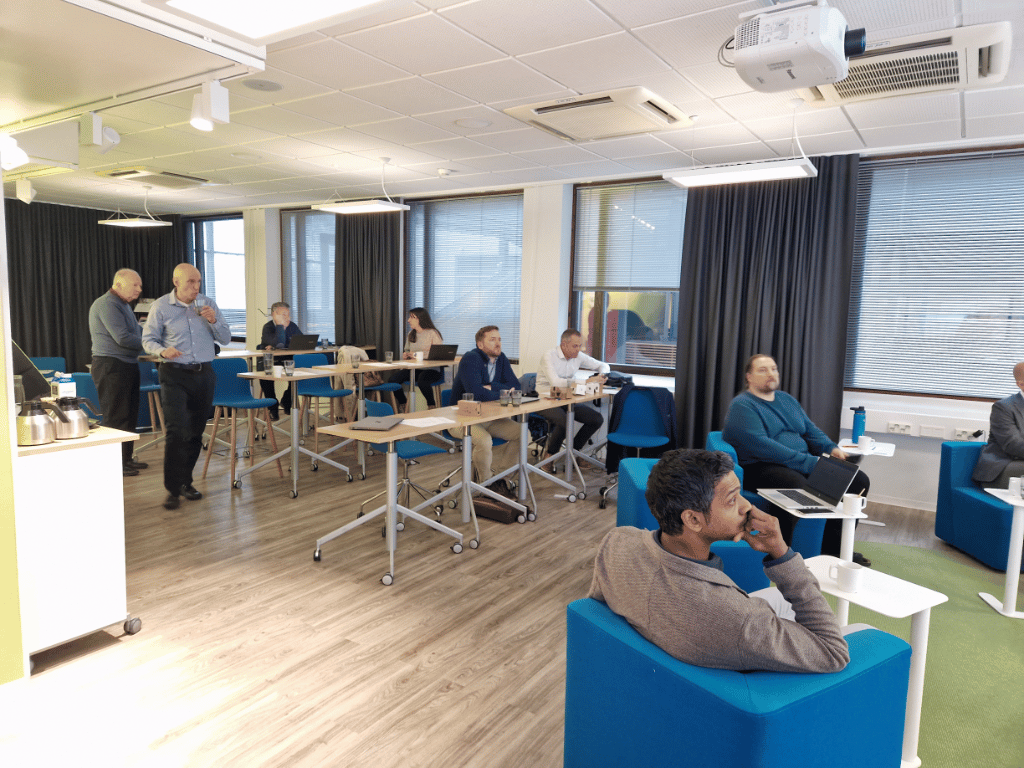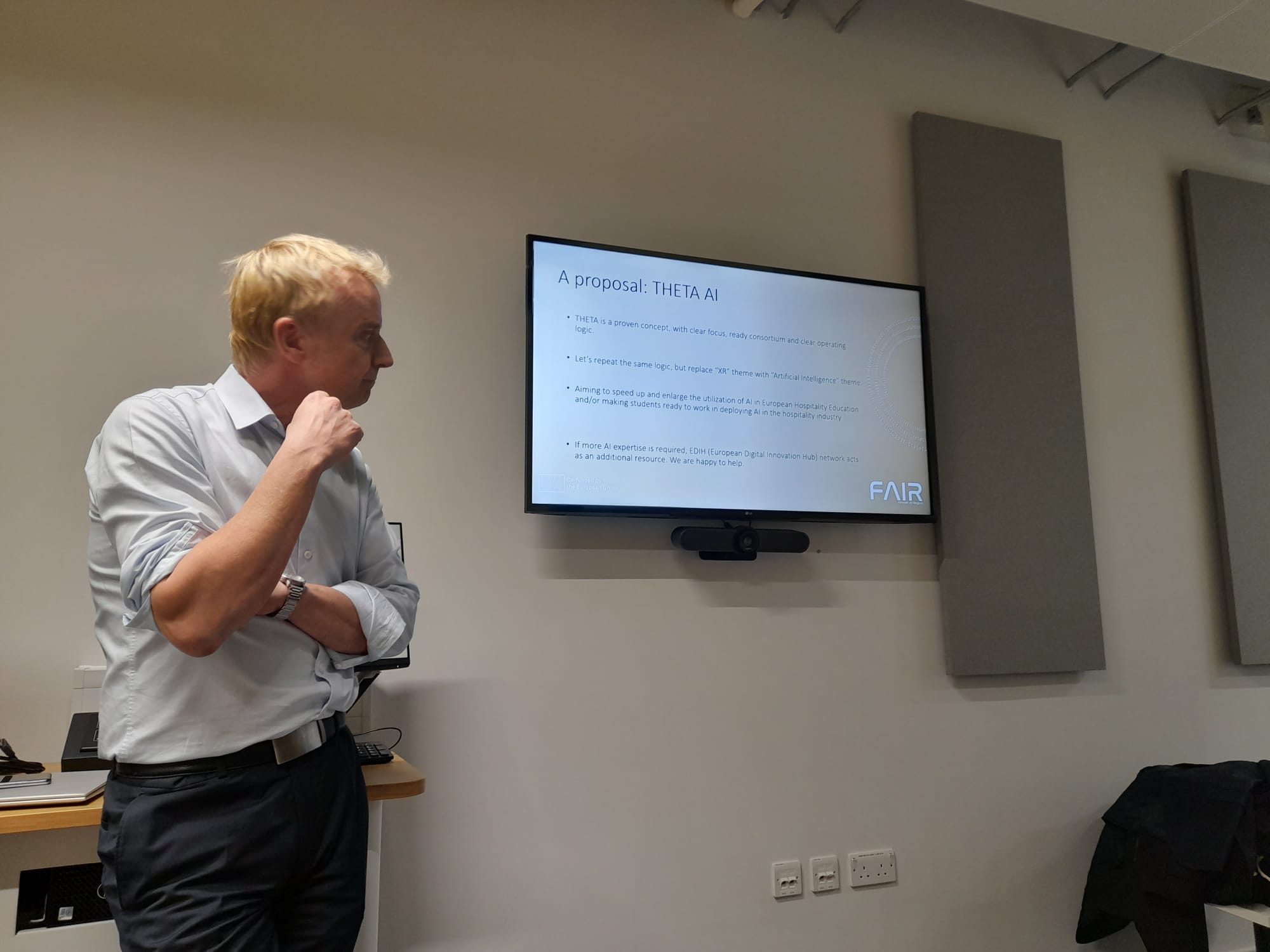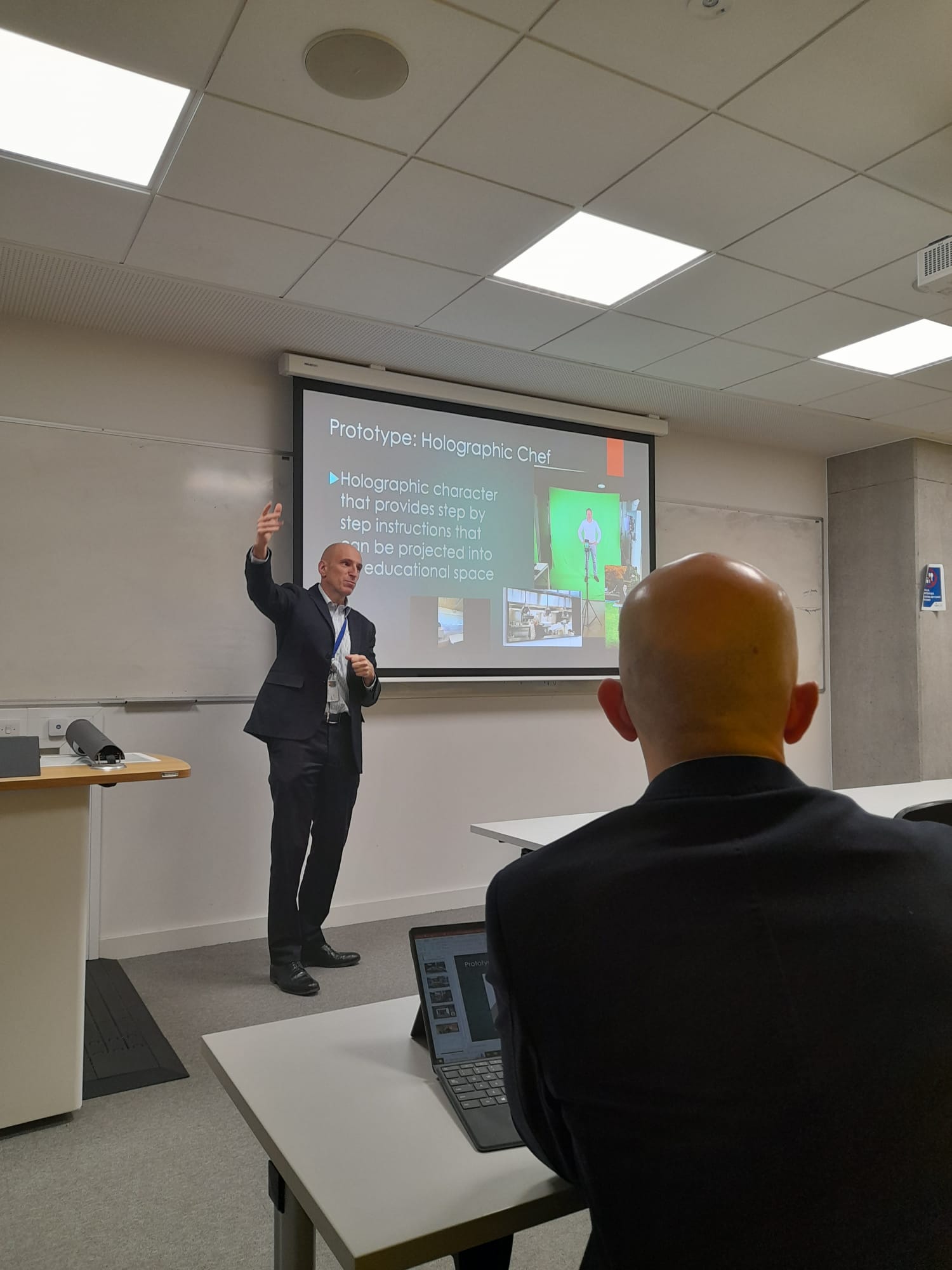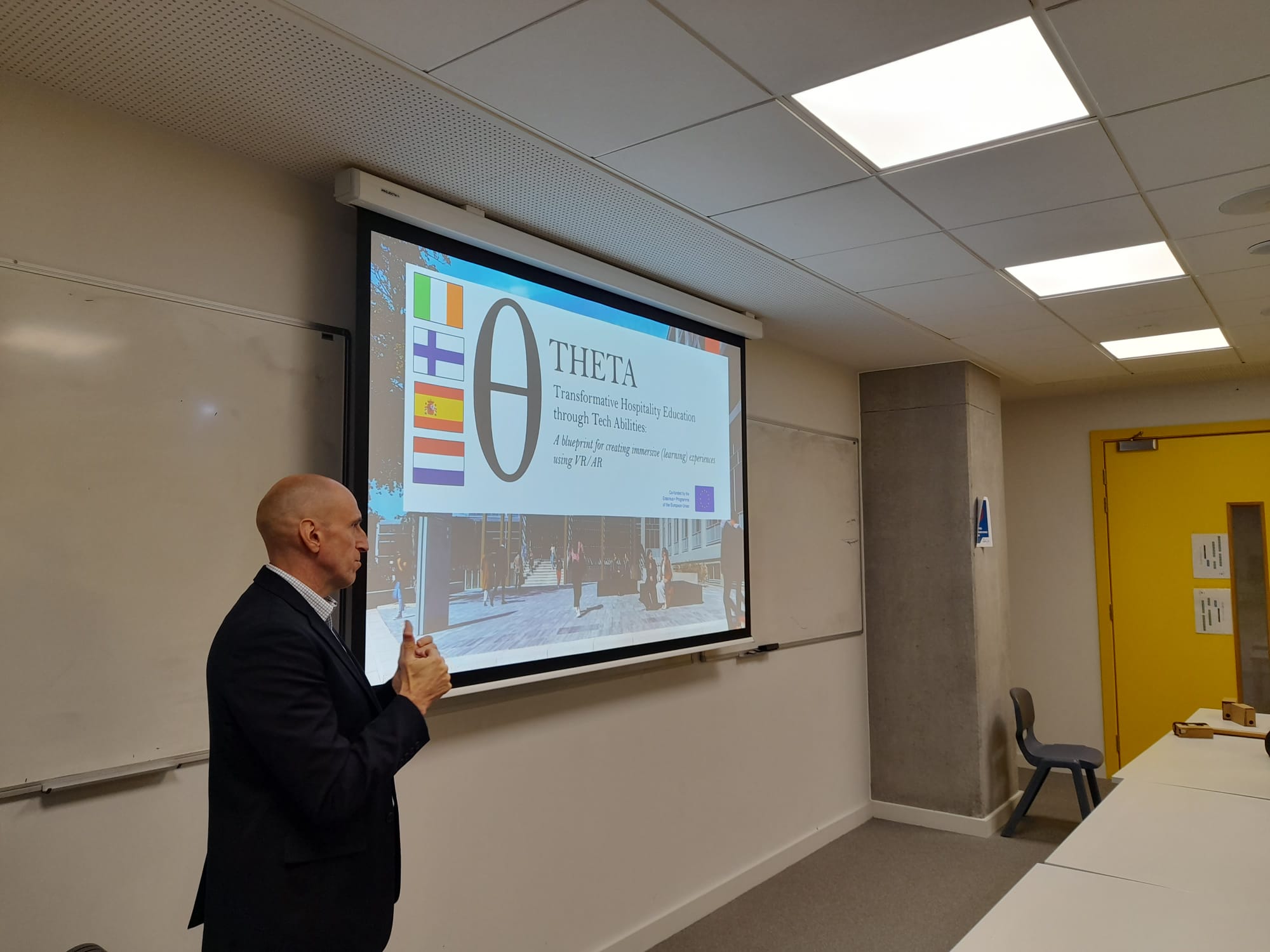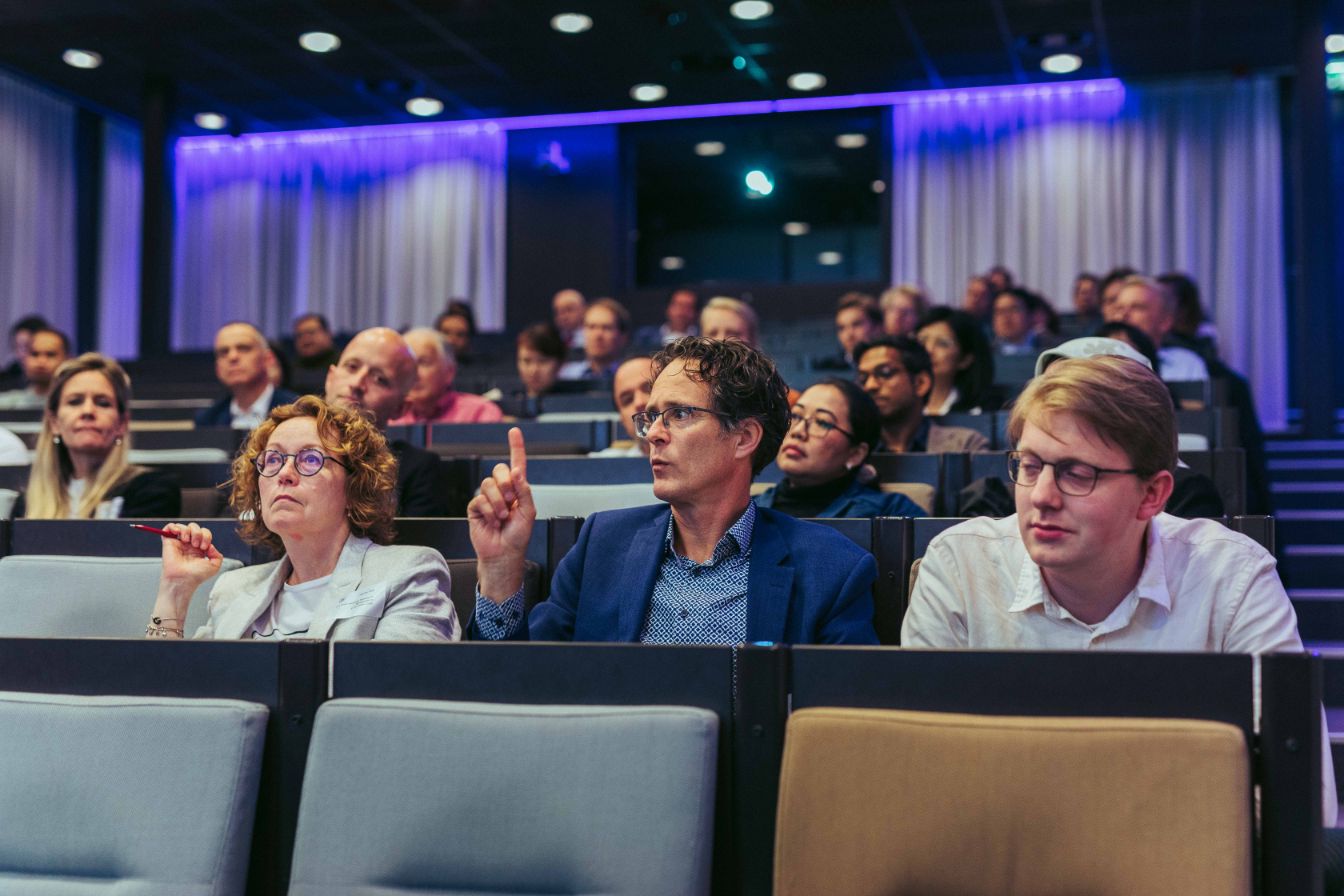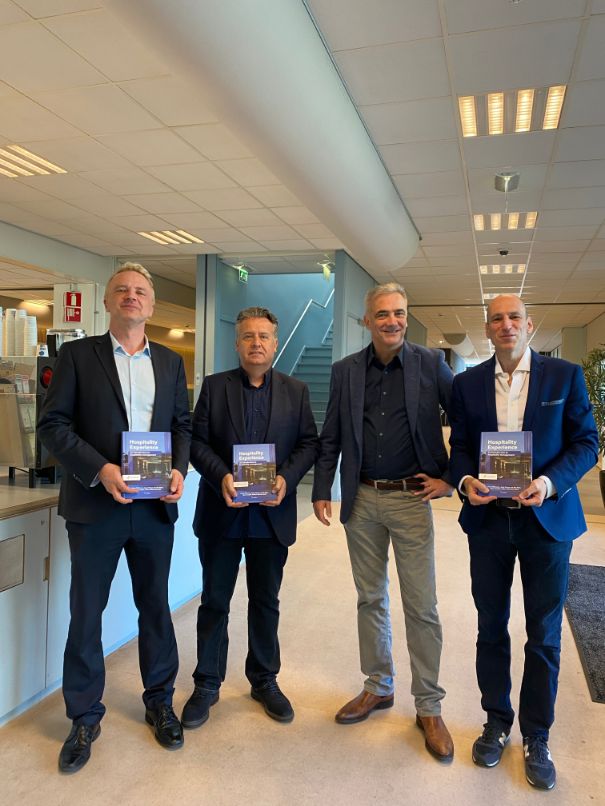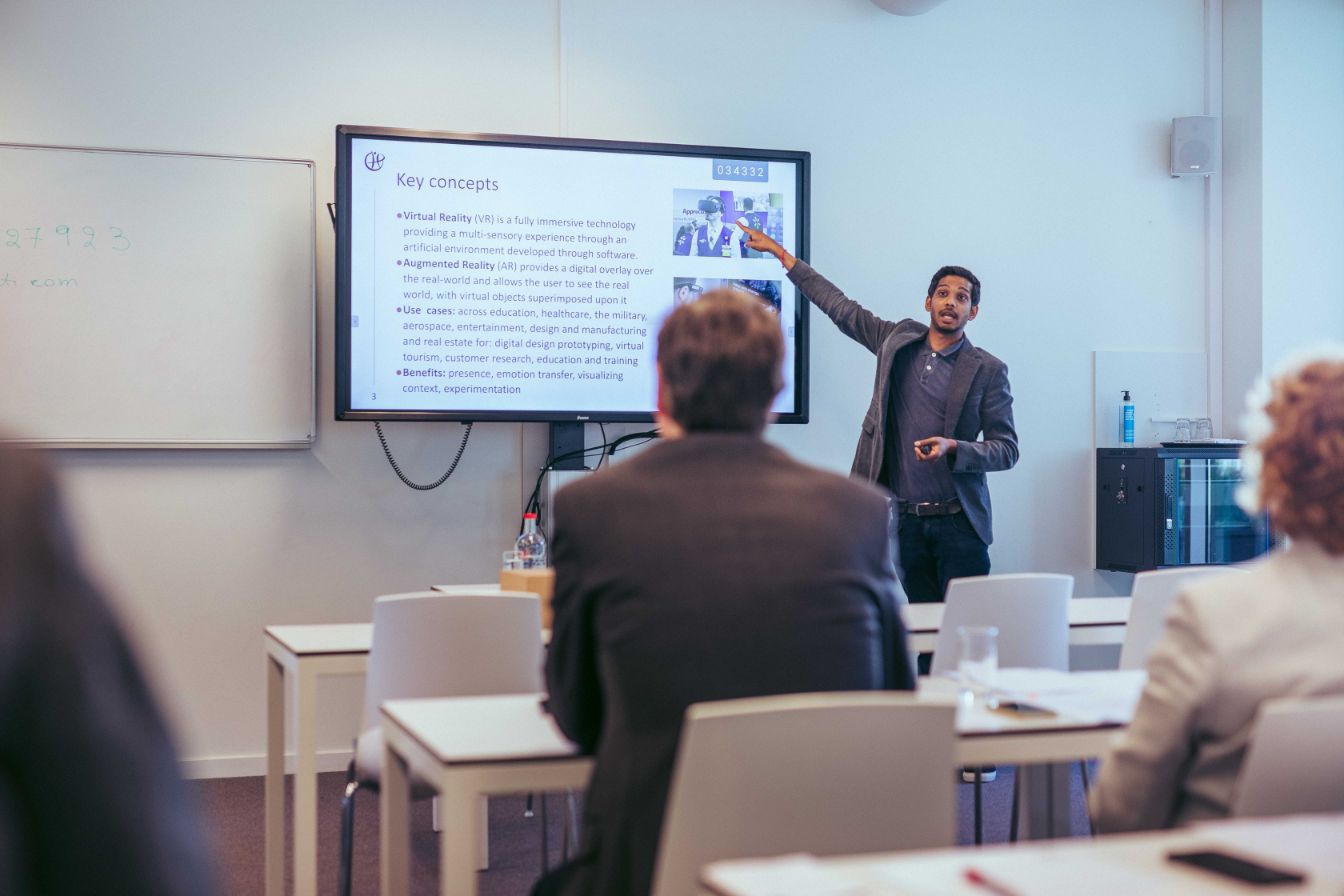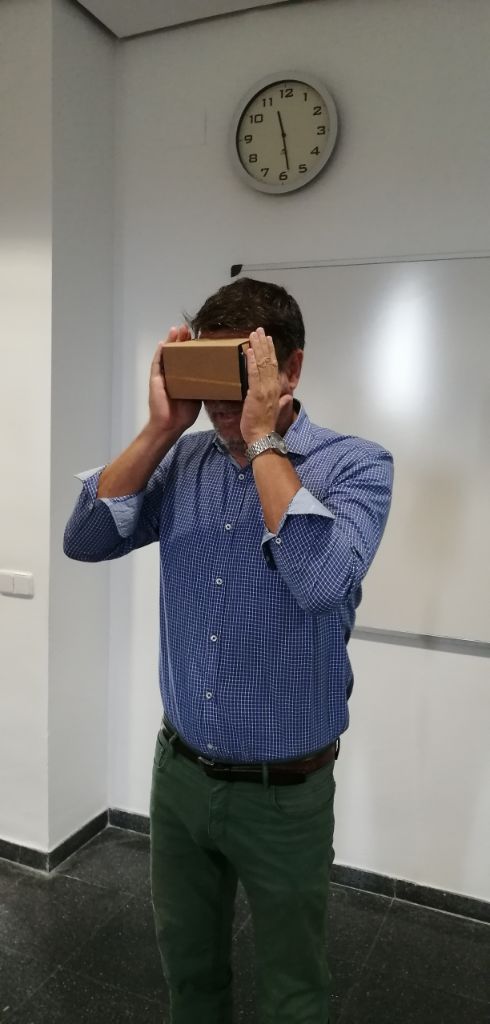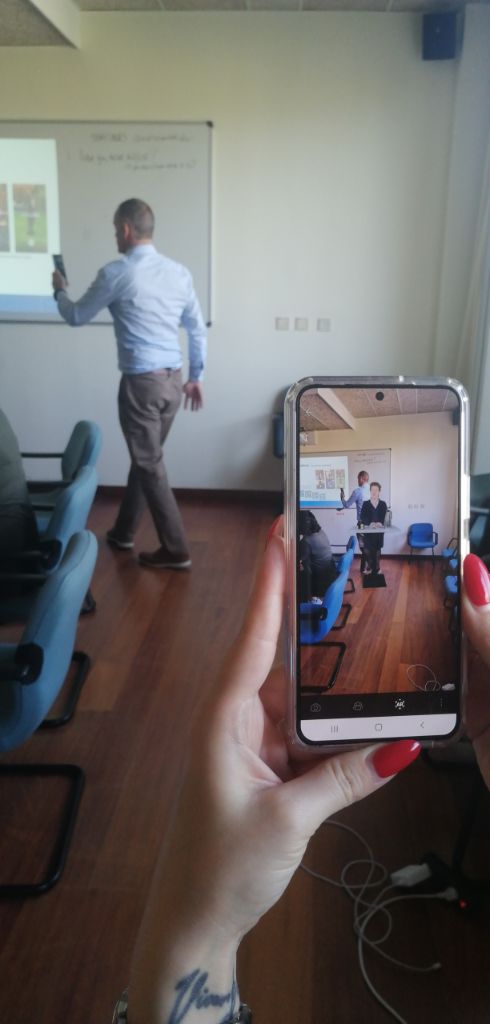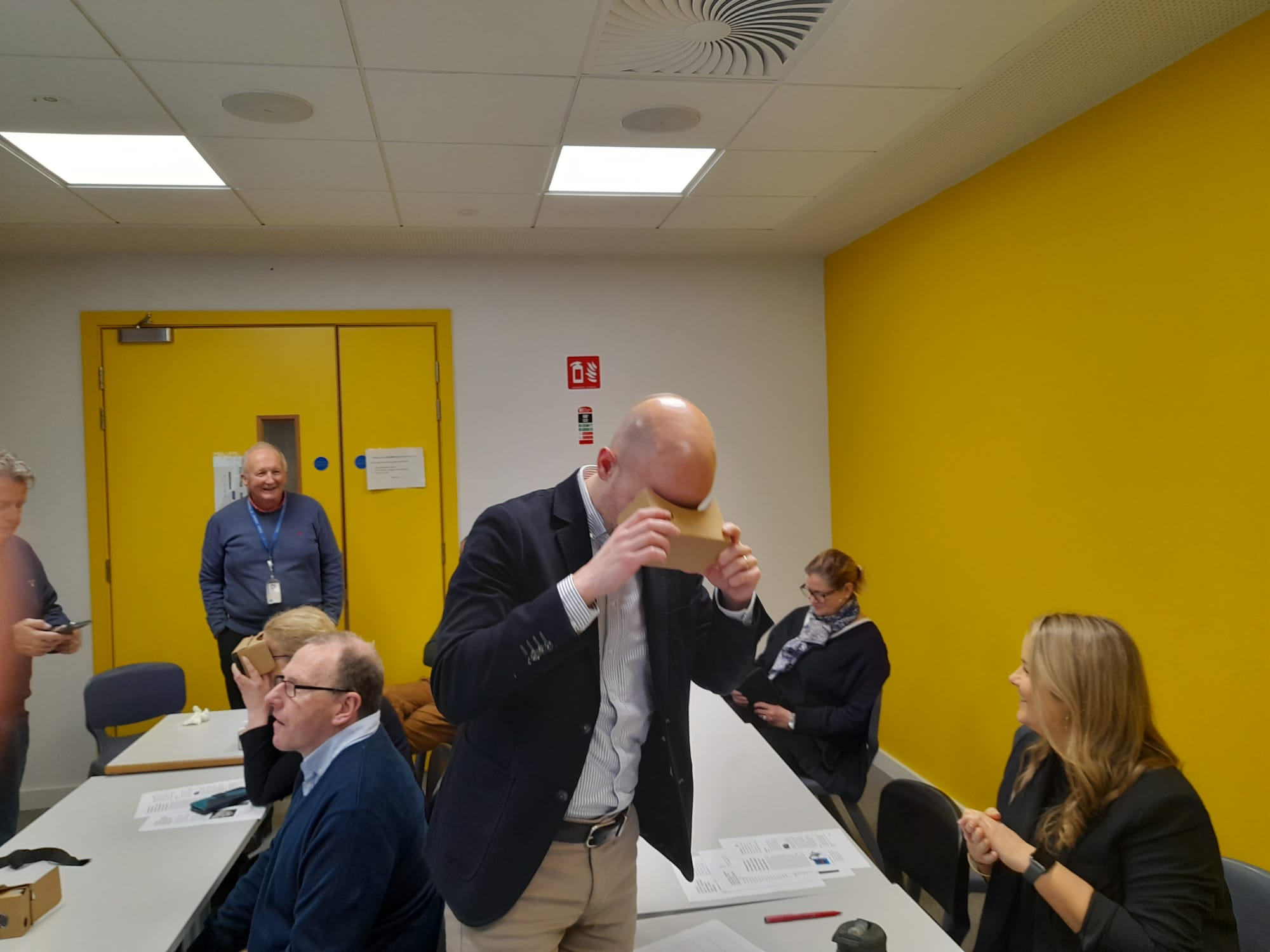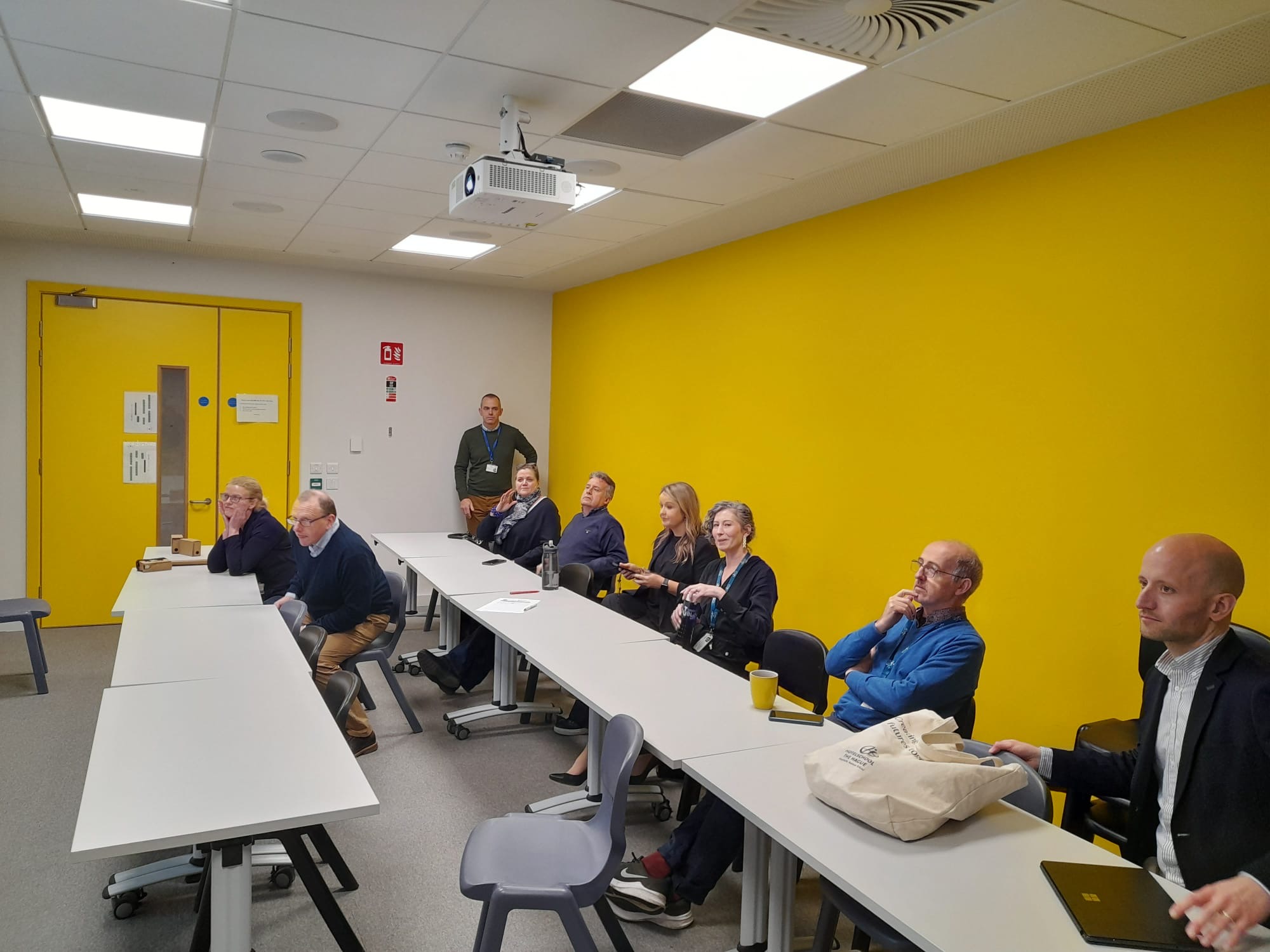Project Information

THETA PROJECT
THETA’s mission is to transform the way tertiary hospitality students learn, making education not just engaging but truly immersive. Our goals include:
1) Connecting students, educators, and industry experts through cutting-edge digital platforms to foster collaborative research experiences.
2) Introducing a groundbreaking educational approach centered around design-oriented research methodology, sparking students’ curiosity and critical thinking.
3) Empowering educators with digital pedagogical skills to create dynamic learning environments.
4) Cultivating students’ digital, entrepreneurial, and self-directed learning capabilities for a competitive edge.
5) Crafting top-notch digital content that makes learning a captivating adventure.
6) Creating a digital ecosystem that readies future professionals for the ever-changing landscape of the hospitality industry.
7) Transforming this ecosystem into a wellspring of innovative ideas that benefit the entire hospitality sector.
8) Sharing the wisdom of leading hospitality institutions worldwide.
Transnational Project Meetings – TPM
The TPM1, organized by HTH, took place in the city of Amsterdam, Netherlands. The main objective of this meeting was to discuss the commencement of the project in its entirety. Furthermore, we sought to align all expectations and delve deeper into clarifying the roles and responsibilities of each stakeholder involved. Participants included consortium partners, IO leaders, and our advisory board. It was an event that fostered fruitful interactions and collaborations for the project.
- View Presentation PDF
- View PDF: Signature
The TPM2, organized by UIB, took place in Palma de Mallorca, Spain. The main purpose of this meeting was to address the progress of IO1 and the commencement of IO2. Additionally, efforts were made to reach a consensus on the project’s quality plan and to monitor both its technical and financial progress. Time was also allocated to preparing the project’s dissemination and impact. Among the attendees were representatives from the consortium partners and IO leaders, all contributing to a productive and enriching dialogue.
- View Presentation
- View PDF: Signatures
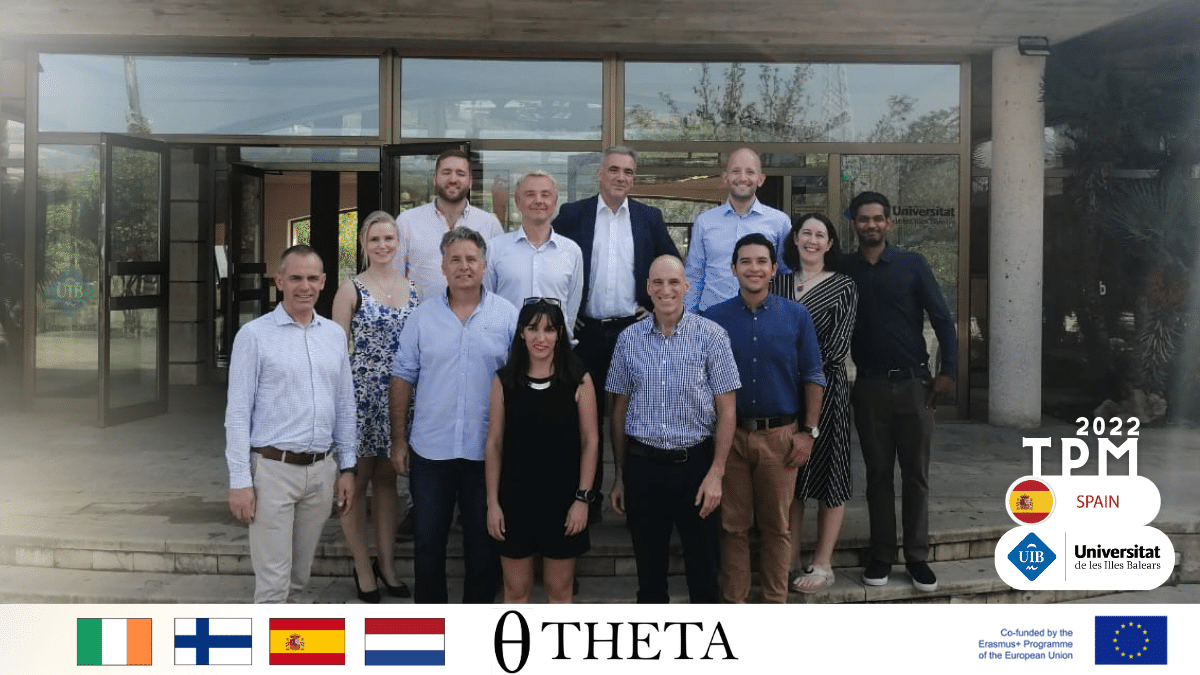
The TPM3 was organized by HTH and took place in Amsterdam, The Netherlands. This crucial meeting was convened with several key objectives in mind. Firstly, our aim was to address the advancements of IO3 and IO4, changes to the website, and the case study. Secondly, an emphasis was placed on aligning everyone with the project’s quality plan. We also seized the opportunity to assess the technical and financial progress of our endeavor. Furthermore, the meeting provided a platform to discuss specific activities tailored to maximize the project’s impact and ensure its optimal dissemination, such as the EuroCHRIE event.
- View PDF 1 Meeting Minutes
- View PDF: Signatures TPM3
The TPM4 was organized by HH and took place in Helsinki, Finland. This meeting was set with specific objectives in mind. Firstly, the aim was to address the progress of IOs 1, 2, and 3, as well as the commencement of IO4. A key point of the gathering was to align and reaffirm commitments to the project’s quality plan. Time was also allocated to monitor both the technical progress and the financial status of the project. Special emphasis was placed on discussing activities geared towards the impact and dissemination of the project. Among the participants were representatives from the consortium partners, IO leaders, and members of the advisory board, all contributing with their expertise and perspectives to the success of the meeting.
- View PDF: Signature
During TPM 5 in Dublin, the following activities were discussed:
Publications Progress: The progress of the academic articles was reviewed with one already in the hands of the editor and the planning of another destined for a professional journal, based on testing the prototypes.
Manual Development: Progress was addressed in developing manuals for the prototypes, which are being refined through an iterative process. Additionally, new content was generated during the LTTA event.
THETA Website Updates: Sections of the website that still need to be completed were discussed, including the need for descriptions for QR codes, clarification of deliverables, and the addition of documentation and photos from the LTTA event.
Preparation of the Final Report: Guidelines were established for the completion of the final project report, including review of the hours assigned to each activity to ensure accuracy and consistency with previous reports.
These activities reflect an ongoing commitment to the development and documentation of the THETA project, ensuring that results and learnings are accessible and useful to the broader educational and professional community.
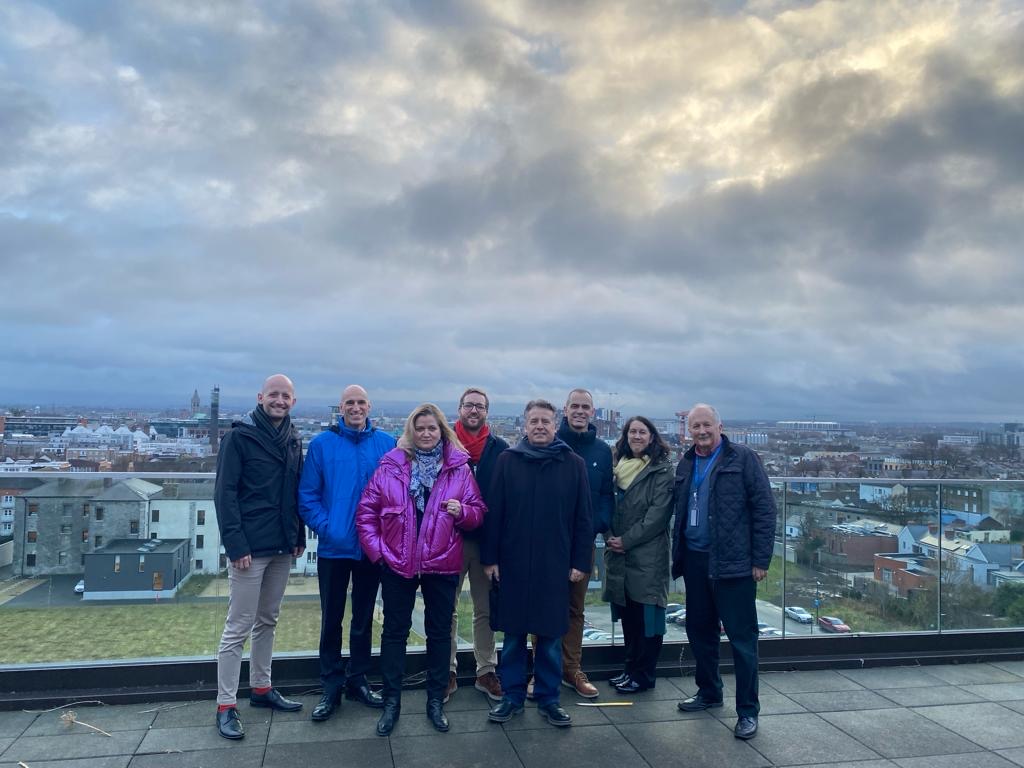
Multiplier Events – ME
On the 18th and 19 of October 2022 University of the Balearic Islands hosted ME2 in their Campus in Palma, Spain. Here academic staff were given an overview of the THETA project and a chance to interact with the AR and VR tools developed.
On the 18th and 19 of October 2022 University of the Balearic Islands hosted ME2 in their Campus in Palma, Spain. Here academic staff were given an overview of the THETA project and a chance to interact with the AR and VR tools developed.
- View PDF: Signature
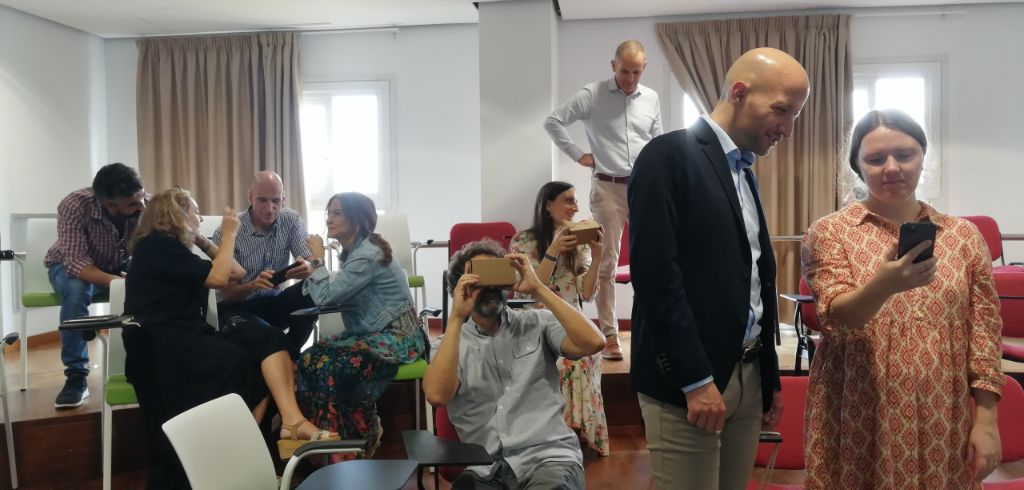

On the 14th and 15 of March 2023 Haaga-Helia University of Applied Sciences hosted ME3 in their CIty Campus in Helsinky, Finland. Here academic staff were given an overview of the THETA project and a chance to interact with the AR and VR tools developed.
- View PDF: Signature
On the 12th and 13 of December 2023 TU Dublin hosted ME4 in their CIty Campus in Dublin, Ireland. Here academic staff were given an overview of the THETA project and a chance to interact with the AR and VR tools developed.
PDF: Signatures
Reports
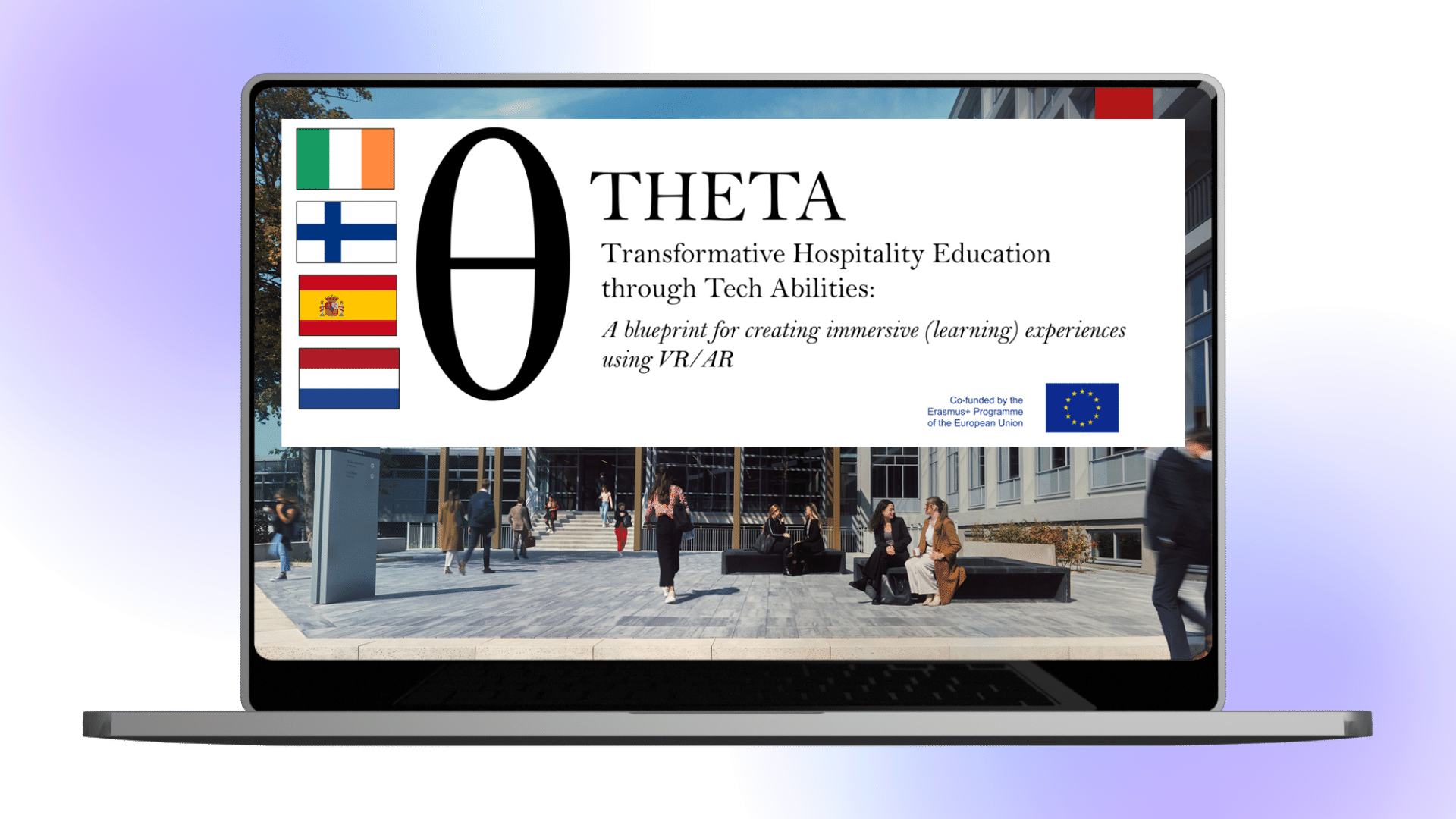
Abstract
Rubrics can help clarify expectations from teaching staff and will show students how to
meet them, making students accountable for their performance. The feedback that students
receive through a grading rubric can help them improve their performance on revised or
subsequent work.

Abstract
During the last few years, learning techniques have changed, both in basic education and in higher education. This change has been accompanied by new technologies such as Augmented Reality (AR) and Virtual Reality (AR). The combination of these technologies in education has allowed a greater immersion, positively affecting the learning and teaching processes. In addition, since the COVID-19 pandemic, this trend has been growing due to the diversity of the different fields of application of these technologies, such as heterogeneity in their combination and their different experiences. It is necessary to review the state of the art to determine the effectiveness of the application of these technologies in the field of university higher education. In the present paper, this aim is achieved by performing a systematic literature review from 2012 to 2022. A total of 129 papers were analyzed. Studies in our review concluded that the application of AR/VR improves learning immersion, especially in hospitality, medicine, and science studies. However, there are also negative effects of using these technologies, such as visual exhaustion and mental fatigue.
In progress
Articles

Abstract
During the last few years, learning techniques have changed, both in basic education and in higher education. This change has been accompanied by new technologies such as Augmented Reality (AR) and Virtual Reality (AR). The combination of these technologies in education has allowed a greater immersion, positively affecting the learning and teaching processes. In addition, since the COVID-19 pandemic, this trend has been growing due to the diversity of the different fields of application of these technologies, such as heterogeneity in their combination and their different experiences. It is necessary to review the state of the art to determine the effectiveness of the application of these technologies in the field of university higher education. In the present paper, this aim is achieved by performing a systematic literature review from 2012 to 2022. A total of 129 papers were analyzed. Studies in our review concluded that the application of AR/VR improves learning immersion, especially in hospitality, medicine, and science studies. However, there are also negative effects of using these technologies, such as visual exhaustion and mental fatigue.

Abstract
Schmidt et al, 2024. In review process as of 3/2024
The discourse around embedding immersive learning content within hospitality education is lively, aiming to (a.) integrate the learning experience within actual professional settings and, (b.) maintain student interest. This paper contributes to the discussion by examining the integration of accessible immersive content in hospitality education, using design-based research (DBR) that prioritizes student input. The research explores how student feedback guides the creation of accessible mobile immersive content to improve hospitality education. Utilizing a mixed-methods strategy, with data gathered from four European universities (20 detailed focus groups and 192 surveys), our results outline a three-phase development strategy, highlighting the need for specific contextual considerations when crafting accessible mobile immersive learning materials for hospitality education: 1.) Determining use cases, 2.) Selecting technological solutions, and 3.) Crafting immersive content. Our findings offer significant insights for hospitality educators, highlighting the necessity for continual innovation and educator skill development in enhancing hospitality education through immersive content integration.
Selected key references:
- Barrett, A. J., Pack, A., & Quaid, E. D. (2021). Understanding learners’ acceptance of high-immersion virtual reality systems: Insights from confirmatory and exploratory PLS-SEM analyses. Computers & Education, 169, 104214. https://doi.org/10.1016/j.compedu.2021.104214
- Bermejo, B., Juiz, C., Cortes, D., Oskam, J., Moilanen, T., Loijas, J., Govender, P., Hussey, J., Schmidt, A. L., Burbach, R., King, D., O’Connor, C., & Dunlea, D. (2023). AR/VR Teaching-Learning Experiences in Higher Education Institutions (HEI): A Systematic Literature Review. Informatics, 10(2), 45. https://doi.org/10.3390/informatics10020045
- Cárdenas-Sainz, B. A., Barrón-Estrada, M. L., Zatarain-Cabada, R., & Ríos-Félix, J. M. (2022). Integration and acceptance of Natural User Interfaces for interactive learning environments. International Journal of Child-Computer Interaction, 31, 100381. https://doi.org/10.1016/j.ijcci.2021.100381
- Chung, C.-Y., & Hsiao, I.-H. (2019). An exploratory study of augmented embodiment for computational thinking. Proceedings of the 24th International Conference on Intelligent User Interfaces: Companion (pp. 37-38). https://doi.org/10.1145/3308557.3308676
- Faqih, K. M. S., & Jaradat, M.-I. R. M. (2021). Integrating TTF and UTAUT2 theories to investigate the adoption of augmented reality technology in education: Perspective from a developing country. Technology in Society, 67, 101787. https://doi.org/10.1016/j.techsoc.2021.101787
- Gioia, D. A., Corley, K. G., & Hamilton, A. L. (2013). Seeking Qualitative Rigor in Inductive Research: Notes on the Gioia Methodology. Organizational Research Methods, 16(1), 15–31. https://doi.org/10.1177/1094428112452151
- Hoyles, C., & Noss, R. (2003). What can digital technologies take from and bring to research in mathematics education? In A. J. Bishop, M. A. Clements, C. Keitel, J. Kilpatrick, & F. K. S. Leung (Eds.), Second International Handbook of Mathematics Education (pp. 323–349). Springer Netherlands. https://doi.org/10.1007/978-94-010-0273-8_11
- Kim, H. J., & Jeong, M. (2018). Research on hospitality and tourism education: Now and future. Tourism Management Perspectives, 25, 119–122. https://doi.org/10.1016/j.tmp.2017.11.025
- Lockwood, T., & Papke, E. (2017). Innovation by design: How any organization can leverage design thinking to produce change, drive new ideas, and deliver meaningful solutions. Red Wheel/Weiser.
- Shen, S., Xu, K., Sotiriadis, M., & Wang, Y. (2022). Exploring the factors influencing the adoption and usage of Augmented Reality and Virtual Reality applications in tourism education within the context of COVID-19 pandemic. Journal of Hospitality, Leisure, Sport & Tourism Education, 30, 100373. https://doi.org/10.1016/j.jhlste.2022.100373

Abstract
Govender, P.D. et al (2024), submitted to the INC Conference as conference proceedings.

Abstract
Loijas et al, 2024. In review process of Strategic Choice Journal as of 3/2024.
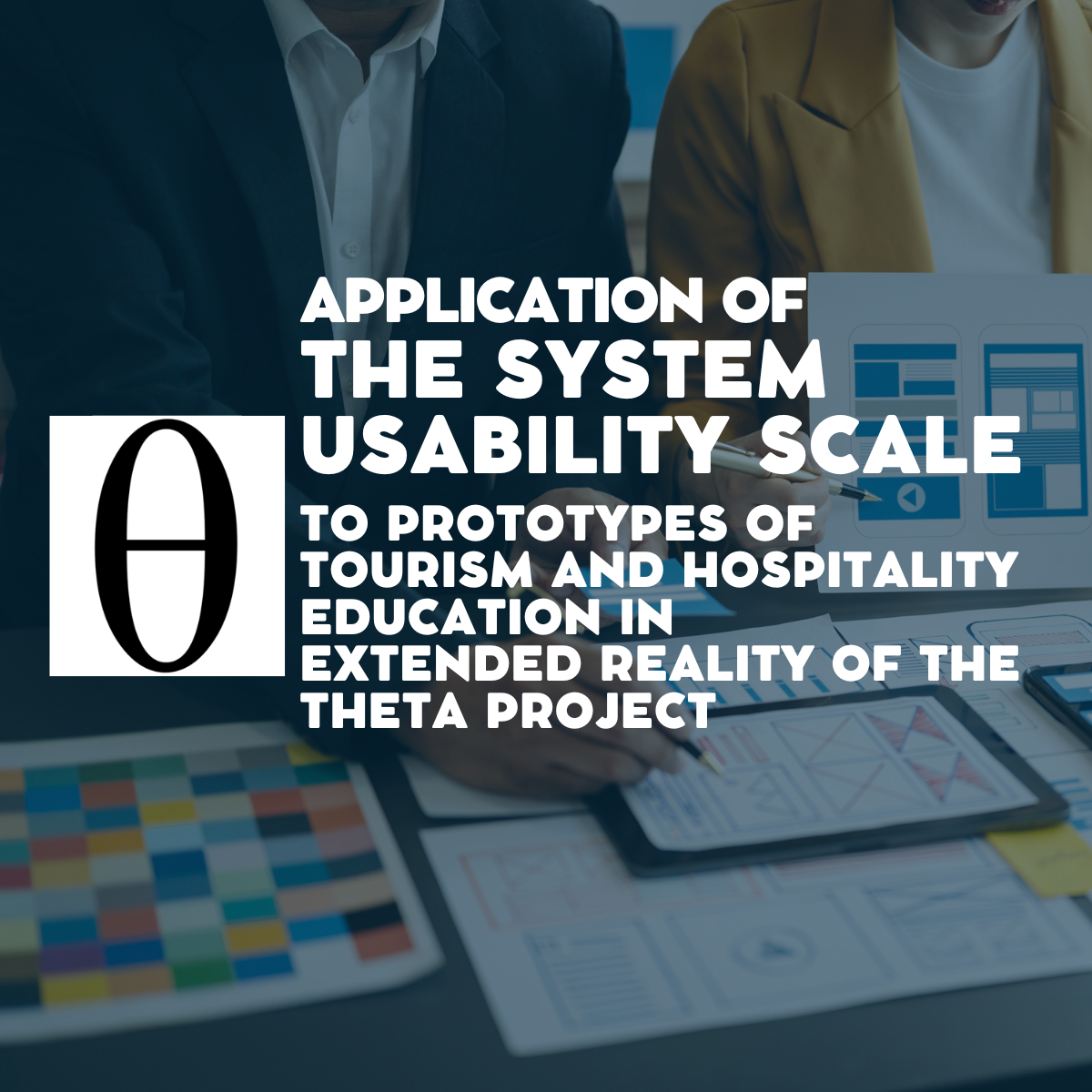
Abstract
David F. Cortes et al, 2024.
This study investigates the usability of extended reality (XR) prototypes in the field of tourism education, focusing on the evaluation through the System Usability Scale (SUS). Framed within the THETA project, a collaboration between the Technological University Dublin, the University of the Balearic Islands, Hotelschool The Hague and Haaga-Helia University of Applied Sciences, the study focuses on four XR prototypes designed to enrich tourism teaching. The prototypes, developed to provide immersive and realistic educational experiences, were evaluated by students from the University of the Balearic Islands using the SUS. The objective was to determine the usability of these prototypes in a real educational context. The results obtained from the SUS indicated high usability, suggesting that the prototypes are suitable for use in tourism educational environments. This finding supports the effectiveness of XR as a pedagogical tool in tourism education and highlights the usefulness of SUS as a reliable method to evaluate the usability of innovative educational technologies. The study contributes to the understanding of how XR technologies can be effectively integrated into the tourism curriculum, opening avenues for future research and practical applications in this field.
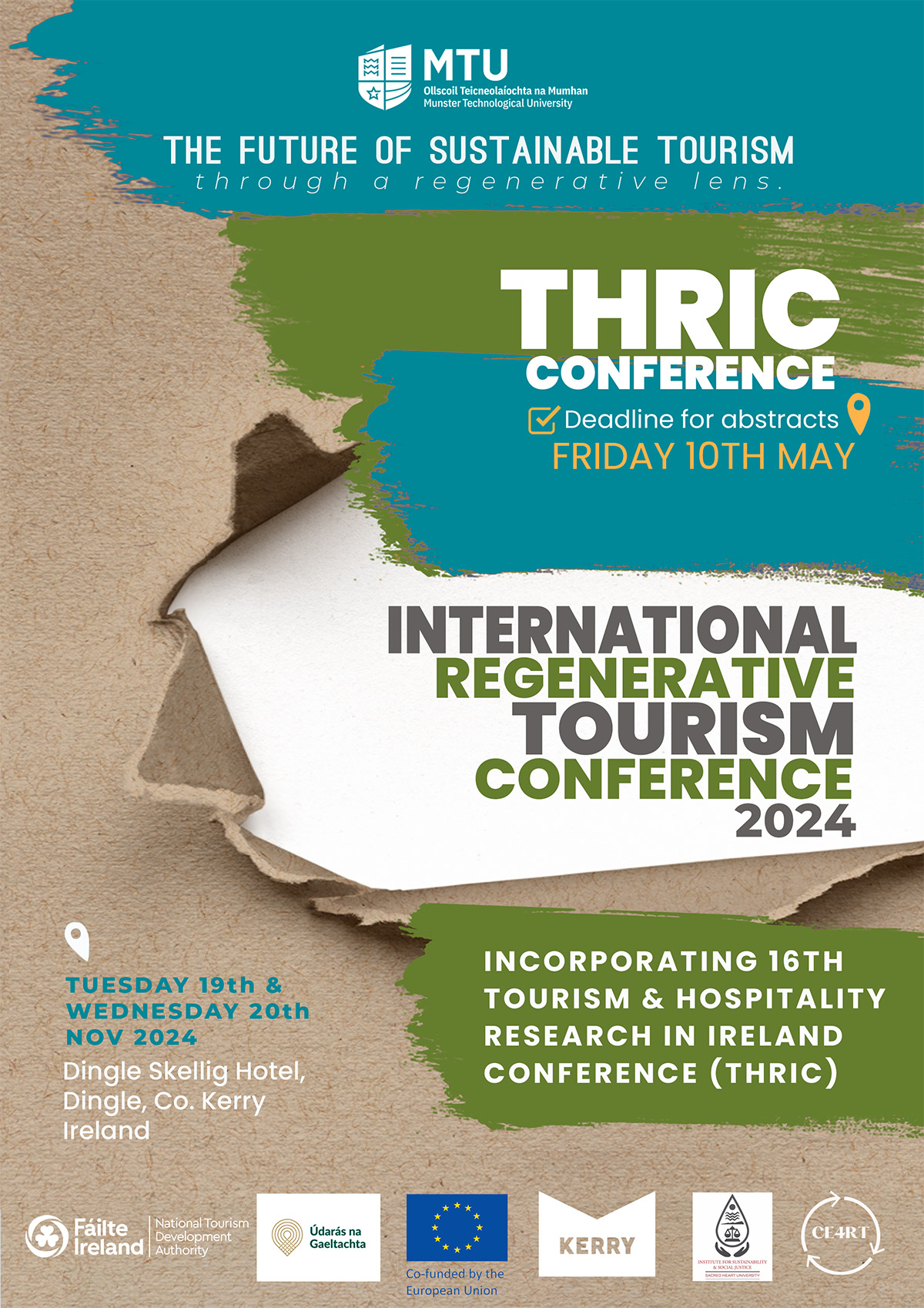
Abstract
Dunlea, D. at al, 2024. Paper to be presented at THRIC Conference, Dingle, Ireland, November 2024
Hospitality educators today face a growing challenge of engaging students and developing new means of bringing the industry into their classrooms in a contextually relevant and timely manner. Four educational institutes received EU funding to explore the potential of using low-tech AR/VR tools in the hospitality classroom as a means of addressing these concerns. Currently, lecturers with limited time and resources, seek simple options that they can adopt without lengthy training and advanced technical support. Hence, this paper explores the practicalities of implementing certain AR/VR tools, with a view to adding to theory surrounding embedding technology in teaching practice.
Subsequently, this paper presents findings from interviews with lecturers in higher education who adopted the AR/VR prototypes. The interviewees identify the substantial benefits offered by adding these tools to the hospitality lecturer’s toolkit, and various obstacles they encountered that need to be addressed. Furthermore, this paper provides insights into the useability, practicality, and flexibility of low-tech options. The paper concludes with recommendations for hospitality educators on how these immersive tools can maximise the face-to-face time with their students and assist in the delivery of learning outcomes.
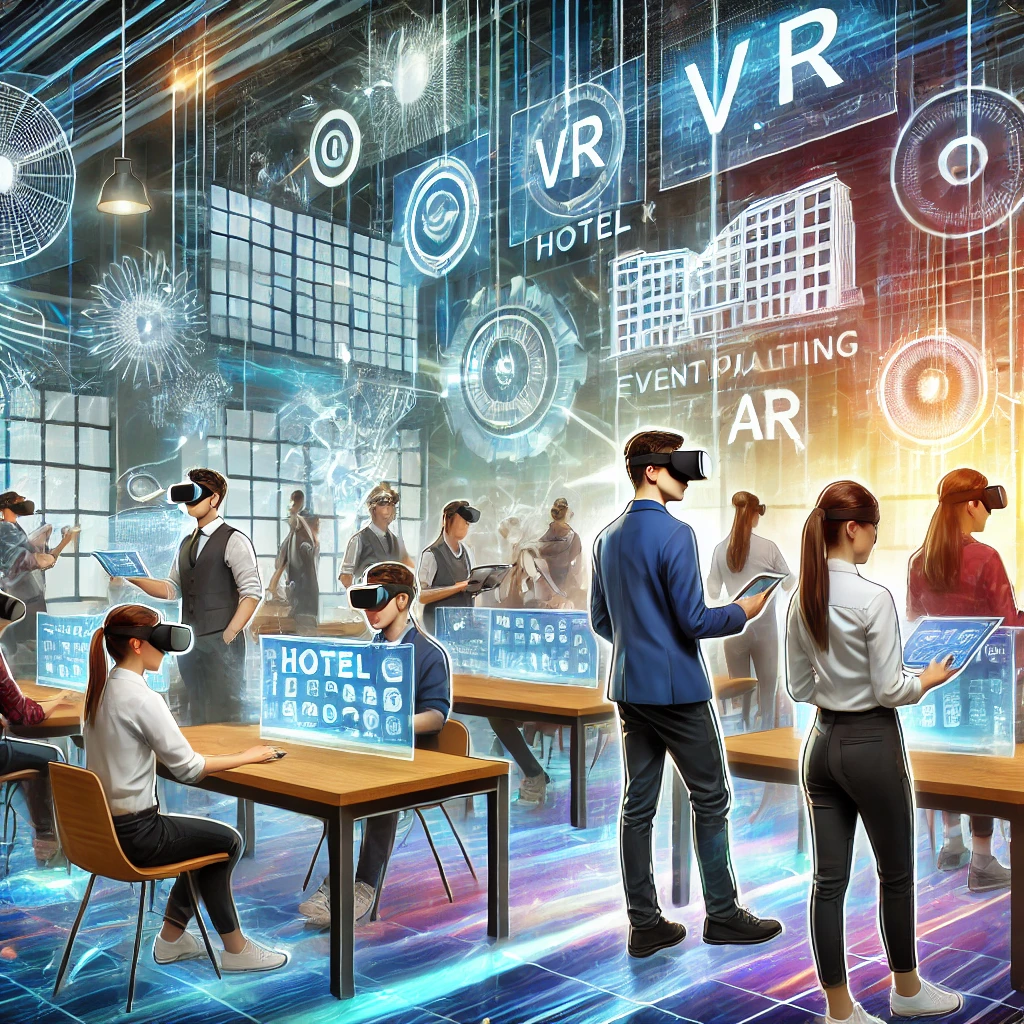
Embedding AR/VR in the Hospitality Classroom: The Educators’ Perspective
Abstract
Hospitality educators today face a growing challenge of engaging students and developing new means of bringing the industry into their classrooms in a contextually relevant and timely manner. Four educational institutes received EU funding to explore the potential of using low-tech AR/VR tools in the hospitality classroom as a means of addressing these
concerns. Currently, lecturers with limited time and resources, seek simple options that they
can adopt without lengthy training and advanced technical support. Hence, this paper explores the practicalities of implementing certain AR/VR tools, with a view to adding to theory surrounding embedding technology in teaching practice.
An exploratory study was conducted, with a sample of eight university lecturers on how the implementation of AR/VR tools in the hospitality classroom unfolded. Students were immersed into various immersive experience across a variety of hospitality scenarios such as a complaining guest. Data was collected via participant journals. Thematic analysis was used to analyse the data.
This paper presents findings from lecturers in higher education who adopted the AR/VR prototypes. The participants identify the substantial benefits offered by adding these tools to the hospitality lecturer’s toolkit. Benefits included increased engagement from learners, particularly emotional responses resulting from the immersive experience and increased class engagement. Various obstacles reported included: connectivity issues, time required to set up the experience and issues around glitches in the system when using in class. This paper provides insights into the usability, practicality, and flexibility of low-tech options. Implications from this research are that AR/VR can be applied in the classroom, however lecturers need sufficient support to develop it effectively. This paper contributes to the emerging literature on the use of this technology in the classroom.
News
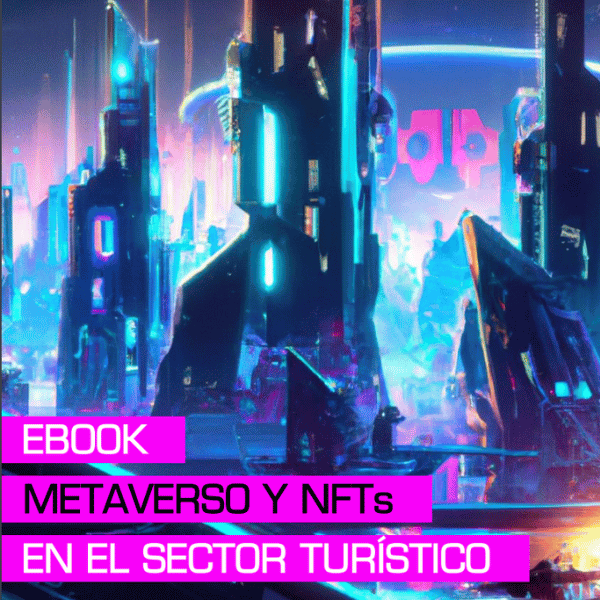
Note
The Tourism Technology Platform, THINKTUR (www.thinktur.org),
deals daily with innovation in tourism, observing how new technological solutions are applied to the sector, increasing its productivity and competitiveness, transforming its offer and connecting all users in the tourism field. They mention the THETA project in their document in Spanish on page 35
.

Note
The THETA project is developing four prototypes using immersive technologies, which are refined using student feedback. One of these is Branched Storytelling, which uses 360° video for soft-skills training giving students the chance to experience the emotion of a difficult conversation with a guest while testing decision-making and critical-thinking skills. Another prototype, The Outlets, allows students to feel present in hospitality outlets such as the kitchen and front desk without having to be there physically while providing an introduction to equipment and processes.
.

Note
What is VR in Education?
Virtual Reality (VR) is a digital technology using visual, auditory and other sensory stimuli provided through a head-mounted display, to create the illusion that a learner is present in a different environment and context. The benefits of virtual reality in education have been widely documented and in this article we will explore how this technology can be used to develop practical knowledge in the classroom. VR education is a growing field, and its applications within tertiary, secondary and primary education are beginning to be understood.
.
Dissemination Activities

EuroCHRIE: How to integrate AR/VR into your Classroom
Note
24 January 2024 – At the EuroCHRIE conference in Vienna, a captivating presentation titled “The Use of New Technologies in Your Classroom by Using Augmented Reality/Virtual Reality” left a lasting impression on attendees. Speakers Pasi Tuominen, Ralf Burbach, Che Govender, and Daniel King wowed the audience with a demonstration that showcased the potential of these technologies. The success in Vienna prompted the team to bring their project to a broader audience through a recent webinar on January 31st.
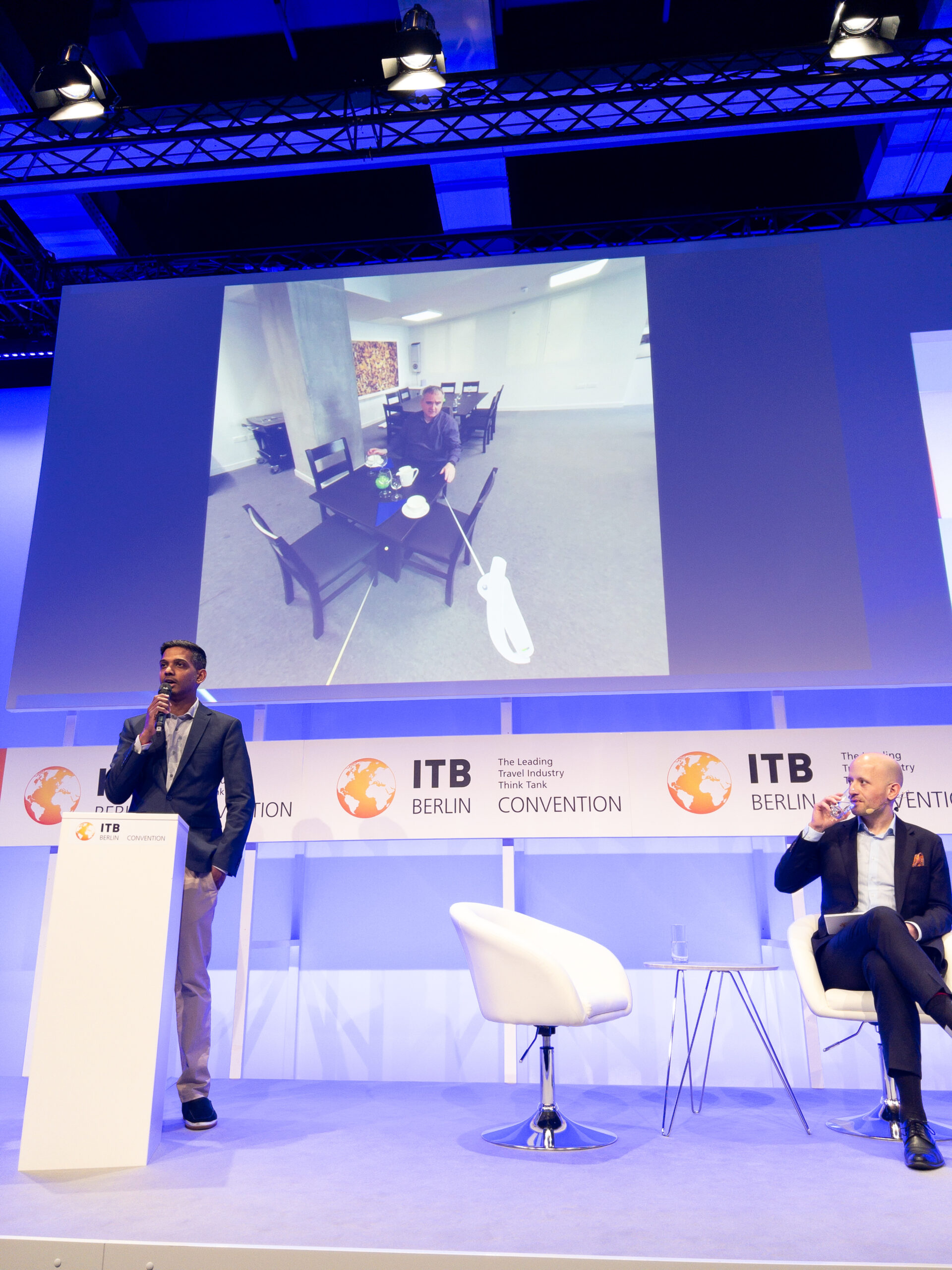
Note
Presentation by Che Govender, Hotelschool The Hague, The Netherlands AR/VR experiences: research informing best practices
Key takeaways:
- Students prefer high levels of interaction, gamification and expect to see 3D content rather than 2D content when experiencing AR/VR for education.
- AR/VR is seen as having high impact on presence and engagement with clear applications within tourism and hospitality education, language training as well as pre-work placement
- Barriers to integrating AR/VR into education include the cost of equipment and licenses, staff time and workload as well as the need for continuous skills of development of educators.
.
